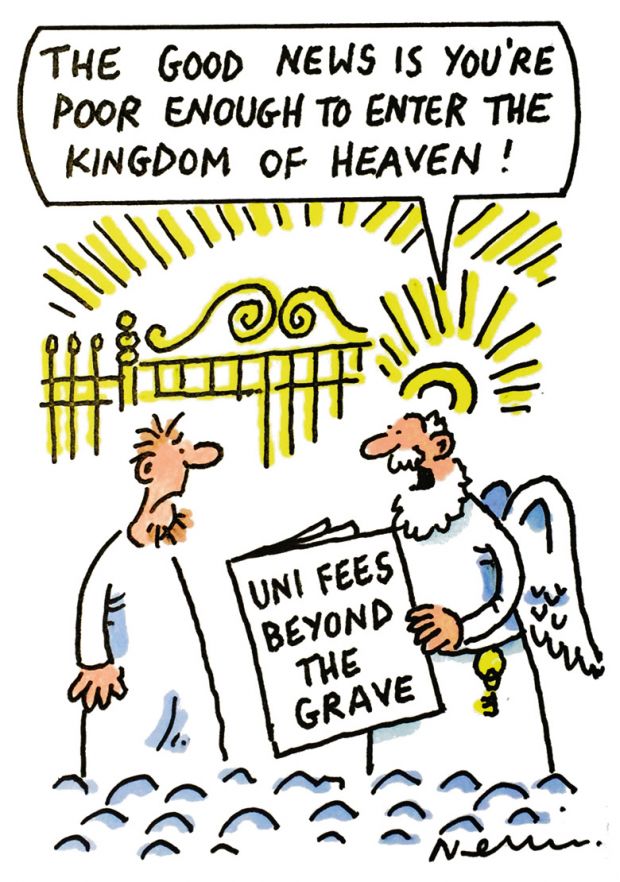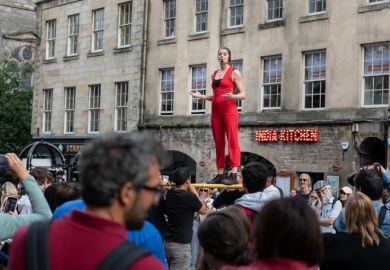
The Australian government’s latest higher education finance reform plans are not off to the greatest start, with media coverage focusing on supposed discussions about proposals for the “controversial move of collecting student debts from the dead”. Ending the Higher Education Contribution Scheme’s write-off of debts after people die – from estates worth more than A$100,000 (£53,213) – would save up to A$800 million a year, one analyst told the Sydney Morning Herald. “Sources in the higher education sector said the proposal had been raised in recent discussions with education minister Simon Birmingham, who is under pressure to find substantial savings in his portfolio,” the newspaper added on 22 March. Students already undertake to repay loans post-graduation via earnings deductions, so presumably undertakers can arrange repayment post-cremation via urn deductions.
Frankenstein disowned his monster when it disappointed his hopes of improving humanity. On an altogether more banal level, the man who suggested naming a polar research ship “Boaty McBoatface” has disowned his idea after it “went viral”. The Natural Environment Research Council “launched their drive for the name of their soon-to-be-built £200m research vessel”, but it soon “crashed under the weight of voting” from people with too much time on their hands. “Much of this was down to James Hand, a former BBC presenter turned press officer, who used the website to suggest…Boaty McBoatface,” which soon registered more than 30,000 votes, The Guardian reported on 21 March. Mr Hand has now “apologised profusely”, he told the newspaper.
“Students at a top university are being given lessons in how to use the toilet,” The Sun reported on 21 March. Illustrated instructions have been posted at the University of Sheffield after cleaners complained about mess, the newspaper said. One poster “shows students how to sit correctly – urging them not to squat on the toilet seat”. A Facebook post on the notices “received hundreds of responses and the seriousness of the signs was questioned by disbelieving students”, the Daily Mail reported. This innovation will surely not displace the longest established tradition of university toilet humour, in which a wag writes above the loo roll: “Humanities degrees, please take one”.
For “career criminals operating at a high level in complex organizations who perpetrate serious crimes, education is quite valuable”, according to a paper delivered to the Royal Economic Society’s annual conference in Brighton on 21 March, titled “Returns to Education and Experience in Criminal Organizations: Evidence from the Italian-American Mafia”. The paper’s authors, Nadia Campaniello and Giovanni Mastrobuoni (University of Essex) and Rowena Gray (University of California, Merced), came to their conclusions about the benefits of education for mobsters after comparing the educational backgrounds of Italian-American mafia members with those of their non-mafia neighbours. Further research will be needed to judge the balance between mobsters’ increased lifetime earnings arising from attending university and reduced lifespans arising from getting whacked.
Theresa May was once likened to a Dalek by an angry vice-chancellor. And just as the Daleks were undermined by one weakness, their inability to negotiate stairs, so the Home Secretary seems to have a key flaw – her inability to find any evidence for her case when challenged in a court of law. On 23 March, immigration tribunal judges ruled in favour of two overseas students who challenged Home Office accusations that they cheated in English language tests, following claims that qualifications offered by the firm Educational Testing Service had been targeted by fraudsters. The judges concluded that “the Secretary of State has not discharged the legal burden” of proving that either student cheated and that she relied on “hearsay” evidence. The Home Office’s crackdown after the ETS claims saw more than 19,000 international students told to leave the UK or barred from the country, while three universities had their licences to recruit overseas students suspended and later reinstated. The judgment brought suggestions that thousands of deported students could now claim the right to return to the country, and that Ms May would face a parliamentary investigation over her handling of the matter.
Register to continue
Why register?
- Registration is free and only takes a moment
- Once registered, you can read 3 articles a month
- Sign up for our newsletter
Subscribe
Or subscribe for unlimited access to:
- Unlimited access to news, views, insights & reviews
- Digital editions
- Digital access to THE’s university and college rankings analysis
Already registered or a current subscriber? Login





